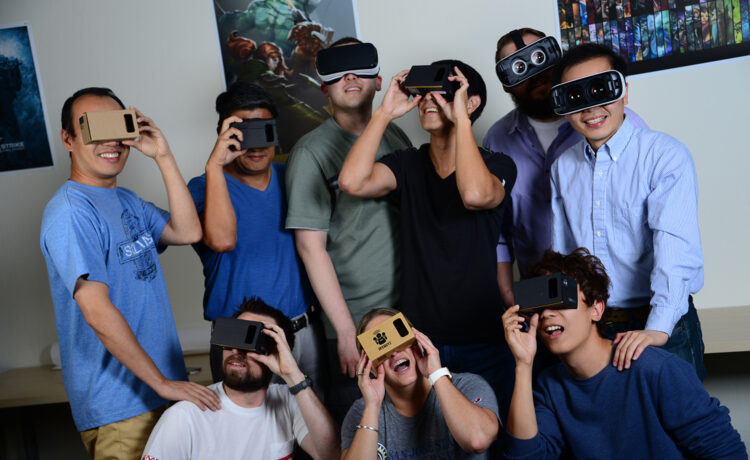Introduction:
In recent years, the gaming industry has seen a significant rise in the development and implementation of virtual reality technology. One of the most popular games to incorporate this technology is Counter-Strike: Global Offensive (CS:GO). The combination of CS:GO and virtual reality has opened up new avenues for players and professional esports teams alike.
The potential of VR for CS:GO training has been widely discussed among players and coaches. With virtual reality, players can simulate real-life scenarios such as bomb defusal or hostage rescue missions, which provides them with an opportunity to train in a more immersive environment. This type of training can improve their reaction time, decision-making skills, and overall performance on the battlefield.
Furthermore, the impact of VR on CS:GO esports is undeniable. Virtual reality tournaments have already taken place with great success, attracting both casual and hardcore fans alike. The use of VR also offers spectators a unique viewing experience that allows them to feel like they are part of the game.
In this essay, we will explore these two aspects in greater detail. Firstly, we will delve into how virtual reality technology can be utilized for CS:GO training purposes. Secondly, we will look at how VR is transforming the world of CS:GO esports by providing players with an immersive gaming experience while offering viewers a new way to engage with competitive gameplay.
The Potential Of Vr For Cs:go Training:
Virtual reality has the potential to revolutionize the way that players train for competitive video games like Counter-Strike: Global Offensive (CS:GO). With VR technology, players can immerse themselves in a fully-realized virtual environment that simulates the gameplay of CS:GO. This allows players to practice and improve their skills without having to worry about real-world consequences or limitations. In addition, VR training can help players develop new strategies and tactics by allowing them to experiment with different approaches in a safe and controlled environment.
One of the key benefits of VR training is its ability to simulate realistic scenarios that are difficult or impossible to replicate in real life. For example, players can practice shooting at moving targets, navigating complex maps, and coordinating with teammates in a way that feels authentic and immersive. This type of training can help players develop muscle memory and reflexes that translate directly into improved performance in actual matches.
Another advantage of VR training is its flexibility. Players can tailor their training sessions to focus on specific areas where they need improvement, whether it’s aim accuracy, movement speed, or teamwork skills. They can also adjust the difficulty level of the simulations as they progress, ensuring that they are constantly challenged but not overwhelmed.
Perhaps most importantly, VR training allows players to develop a deeper understanding of the game itself. By immersing themselves in a virtual world that closely resembles CS:GO gameplay, they can gain insights into how different aspects of the game work together and how best to exploit them for strategic advantage. This knowledge is essential for success at higher levels of play where every detail matters.
Virtual reality has enormous potential as a tool for CS:GO training. By providing an immersive and flexible way to practice key skills and strategies, it could help take player performance to new heights while also deepening their understanding of the game itself. As VR technology continues to improve and become more accessible, it’s likely we will see more and more players incorporating it into their training routines.
The Impact Of Vr On Cs:go Esports:
The infusion of Virtual Reality (VR) into the world of Counter-Strike: Global Offensive (CS:GO) has brought forth a paradigm shift in the Esports scene. With VR, players can experience an immersive gaming environment that enhances their gaming experience by creating a sense of presence in the game. The impact of VR on CS:GO Esports has been profound and diverse. Firstly, it has transformed how players train for tournaments and competitions. In traditional training methods, players would practice using mouse and keyboard to improve their aim and reaction time. However, with VR technology, players can now engage in realistic simulations that mimic real-life scenarios such as bomb defusal or hostage rescue missions. This immersive training environment enables players to hone their skills and gain an edge over other competitors.
Moreover, VR’s impact on CS:GO Esports is also evident in how it enhances spectatorship and viewership. Fans can now watch live matches through VR headsets or 360-degree cameras that provide a more engaging viewing experience than traditional streams. This creates a more immersive experience for fans who feel like they are part of the action, which ultimately boosts viewer engagement.
Furthermore, the integration of VR into CS:GO Esports has led to new revenue opportunities for tournament organizers and sponsors. With increased viewer engagement, there is potential for higher advertising revenue from sponsors seeking to reach out to esports audiences.
Finally, the use of VR technology also offers new opportunities for game developers to create new game modes that take advantage of this technology’s unique capabilities. For instance, Valve Corporation –the creators of CS:GO– have created a new mode called “Danger Zone,” which allows players to engage in battle royale-style gameplay within a virtual reality setting.
The impact of Virtual Reality on CS:GO Esports is far-reaching and transformative; it has revolutionized how players train for tournaments while enhancing spectatorship experiences and providing new revenue streams for tournament organizers and sponsors. The integration of VR into CS:GO Esports has also opened up new opportunities for game developers to create innovative game modes that take advantage of this technology’s unique capabilities.
Conclusion:
In conclusion, the intersection of CS:GO and virtual reality presents a promising future for both the game and its players. The potential of VR for CS:GO training is undeniable as it provides a more immersive and realistic experience for players to practice and improve their skills. Moreover, VR training can also assist in reducing injuries that are commonly associated with prolonged gaming sessions.
On the other hand, the impact of VR on CS:GO esports is also significant. With the growing popularity of esports, incorporating VR technology into tournaments can provide a more engaging experience for spectators. It allows them to watch matches from different perspectives and even feel like they are part of the action.
The integration of VR in CS:GO is still in its early stages, but it has already shown great potential for enhancing gameplay and improving player experiences. As technology continues to develop, we can expect even more exciting advancements that will revolutionize how we play and watch esports.
Overall, the intersection of CS:GO and virtual reality is an exciting development that has huge implications for both casual players and professional competitors alike. It offers new opportunities to train effectively while providing an immersive experience that enhances gameplay. As such, it is undoubtedly a space worth watching closely in the coming years. Learn more on csgo book.


